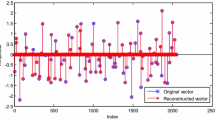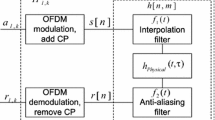Abstract
In the paper a sparse approximation based compressive channel feedback scheme is proposed in multiple input multiple output (MIMO) communication system. The redundant dictionary is applied for the channel sparse approximation. In order to reduce feedback resource consumption, a split compression is used for the sparse vector approximation. The impacts of codebook, codeword selection, measurement matrix and approximation error on capacity are analyzed. Simulations show that Grassmanian codebook/dictionary is more preferable for the channel approximation. In the point of capacity, the compressive digital and analog feedback outperform the random vector quantization feedback scheme with the same feedback resource consumption for large antenna array. Since the proposed compressive feedback scheme is not related to the antenna number, it is useful especially for the larger antenna array such as massive MIMO.









Similar content being viewed by others
References
Marzetta, T. L., & Hochwald, B. M. (2006). Fast transfer of channel state information in wireless systems. IEEE Transaction on Signal Processing, 54(4), 1268–1278.
Kobayashi, M., & Caire, G. (2007). Joint beamforming and scheduling for a multi-antenna downlink with imperfect transmitter channel knowledge. IEEE Jounal on Selected Areas in Communications, 25(7), 1468–1477.
Jindal, N. (2006). MIMO broadcast channels with finite rate feedback. IEEE Transaction on Informantion Theory, 52(11), 5045–5059.
Love, D. J., Heath, R. W., & Strohmer, T. (2005). Limited feedback unitary precoding for spatial multiplexing systems. IEEE Transaction on Information Theory, 51(8), 1967–2976.
Isaacs, J. C., & Roberts, R. (2009). Constructions of equiangular tight frames with genetic algorithms. In IEEE international conference on systems, man and cybernetics (pp. 11–14), San Antonio, TX, USA.
Shanechi, M. M., Porat, R., & Erez, U. (2010). Comparison of practical feedback algorithms for multiuser MIMO. IEEE Transactions on Communiations, 58(8), 2436–2446.
Sacristán-Murga, D., & Pascual-Iserte, A. (2010). Differential feedback of MIMO channels Gram matrix based on geodesic curves. IEEE Transactions on Wirless Communications, 9(12), 3714–3723.
Kim, T., Love, D. J., Clerckx, B., & Kim, S. (2008). Differential roatation feedback MIMO system for temporally correlated channels. In IEEE conference on global telecommunications (pp. 1–5), New Orleans, LA, USA.
Zhang, L., Song, L., Ma, M., et al. (2001). On the minimum differential feedback for time-correltated MIMO Rayleigh block-fading channels. In IEEE conference on global telecommunications (pp. 1–5), Miami, FL, USA.
Li, Y., & Song, R. (2011). Novel schemes of CQI feedback compression based on compressive sensing for adaptive OFDM transmission. KSII Transactions on Internet and Information Systems, 5(4), 703–719.
Eriksson, T., & Ottosson, T. (2007). Compression of feedback in adaptive OFDM-based systems using scheduling. IEEE Communications Letters, 11(11), 859–861.
Huang, K., Mondal, B., Heath, R. W. Jr., & Andrews, J. G. (2006). Multi-antenna limited feedback for temporally-correlated channels: Feedback compression. In IEEE conference on global telecommunications (pp. 1–5), San Francisco, CA, USA.
Kuo, P.-H., Kung, H. T., & Ting, P.-A. (2012). Compressive sensing based channel feedback protocols for spatially-correlated massive antenna arrays. In 2012 IEEE wireless communications and networking conference (pp. 1–6).
Donoho, D. L. (2006). Compressed sensing. IEEE Transactions on Information Theory, 52(4), 1289–1306.
Lu, W., Liu, Y., & Wang, D. (2013). Efficient feedback scheme based on compressed sensing in MIMO wireless neworks. Computers and Electrical Engineering, 39(6), 1587–1600.
Song, H., Seo, W., & Hong, D. (2010). Compressive feedback based on sparse approximation for multiuser MIMO systems. IEEE Transactions on Vehicular Technology, 59(2), 1017–1023.
Li, Y., & Song, R. (2012). A new compressive feedback scheme based on distributed compressed sensing for time-correlated MIMO channel. KSII Transactions on Internet and Information Systems, 6(2), 580–582.
Yoo, T., & Goldsmith, A. (2006). On the optimality of multiantenna broadcast scheduling using zero-forcing beamforming. IEEE Journal on Selected Areas in Communications, 24(3), 528–541.
Fletcher, A. K., Rangan, S., Goyal, V. K., & Ramchandran, K. (2006). Denoising by sparse approximation: Error bounds based on rate-distortion theory. EURASIP Journal on Applied in Signal Processing, 1–19.
Acknowledgments
This work is supported by the 863 Project No. 2014AA01A701, National Key Project 2013ZX03003-002-04 and NSFC 61471408 and 61231007.
Author information
Authors and Affiliations
Corresponding author
Rights and permissions
About this article
Cite this article
Lu, W., Tan, X., Liu, Q. et al. Compressive Channel Feedback Schemes Based on Redundant Dictionary in MIMO Communication Systems. Wireless Pers Commun 82, 2215–2229 (2015). https://doi.org/10.1007/s11277-015-2343-0
Published:
Issue Date:
DOI: https://doi.org/10.1007/s11277-015-2343-0




